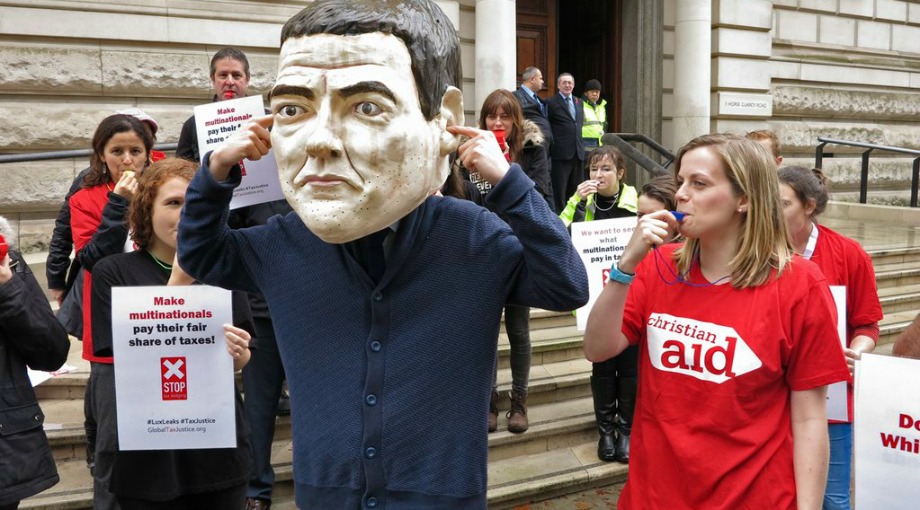The anniversary of the publication of ICIJ’s Luxembourg Leaks investigation prompted protests and the release of new tax reports on tax policy failures in Europe, as civil society and politicians continue to pressure authorities for more action against corporate tax avoidance.
On November 4 and 5, 2014 ICIJ and more than 30 media outlets around the world began publishing stories that revealed how secret agreements between Luxembourg authorities and some of the world’s biggest multinational corporations had allowed more than 370 companies – including Disney, IKEA, Pepsi and Deutsche Bank – to avoid billions of euros in taxes on profits they channeled through Luxembourg.
At the time of release, the investigation led to calls for the resignation of then newly-elected European Commission President Jean-Claude Juncker, who had previously served as Luxembourg’s prime minister at the time many of these tax rulings had been agreed to by Luxembourg authorities. A special committee was set up by the European Parliament to investigate the revelations, and European Commissioner for Competition Margrethe Vestager said she would use the documents, published by ICIJ in an interactive online database, to help with ongoing and expanded investigations into corporate tax avoidance in Europe.
However on the anniversary of the publication, politicians and activists across Europe took the opportunity to criticize the European Union for not doing enough to crack down on multinationals’ tax-avoiding activities.
On Wednesday protesters gathered outside the European Parliament in Brussels, the Treasury building in the United Kingdom and other locations around Europe to mark the occasion, and held up signs and blew whistles to show their support for the whistleblowers, including former Luxembourg PricewaterhouseCoopers employee Antoine Deltour, who are currently facing trial for allegedly leaking tax documents.
#Tax campaigners deal EU blow a year after #LuxLeaks @HeardInEurope https://t.co/90vvAraLm6 https://t.co/hWkYKeUaPj @eurodad @toveryding
— Heard in Europe (@HeardInEurope) November 4, 2015
In the U.K. a group of politicians and activists marked the anniversary with an open letter calling on the European Union to enact new rules, including country-by-country reporting of corporate activities and taxes paid. The letter, signed by more than 30 current and former British and European politicians, academics and transparency activists including renowned economist Thomas Piketty and shadow U.K. chancellor John McDonnell, said action against tax-dodging was essential for “reigniting economic growth” in Europe.
“A year after the scandal of LuxLeaks, European citizens and responsible businesses cannot wait any longer for meaningful action,” the letter read. “It is high time for member states to learn the lessons of LuxLeaks, finally put an end to multinationals’ tax-dodging, and start working towards a fair system of company taxation.”
Earlier in the week, a coalition of non-government organizations known as the European Network on Debt and Development (Eurodad) released a new report that accused the European Union of broad failures in its attempts to tackle tax evasion.
Titled Fifty Shades of Tax Dodging, the report named Germany alongside Luxembourg as the worst culprits when it came to options for concealing money, and criticized the UK and France for blocking developing countries from taking part in discussions on how to improve global tax standards.
“Although tweaks have been made and some loopholes have been closed, the complex and dysfunctional EU system of corporate tax rulings, treaties, letterbox companies and special corporate tax regimes still remains in place,” the report said.
“Defence mechanisms against ‘harmful tax practices’ that have been introduced by governments, only seem partially effective and are not available to most developing countries. They are also undermined by a strong political commitment to continue so-called ‘tax competition’ between governments trying to attract multinational corporations with lucrative tax reduction opportunities – also known as the ‘race to the bottom on corporate taxation’. The result is an EU tax system that still allows a wide range of options for tax dodging by multinational corporations.”
The report also took aim at ineffective transparency measures introduced since LuxLeaks, and highlighted the plight of whistleblowers who, to now, have been the primary source of public information about the tax practices of multinational companies.
The special European Parliament committee established to investigate the practices revealed by the LuxLeaks investigation will hold its final meeting on November 16 before releasing what is anticipated to be an extremely critical report on the issue. The committee has again invited several multinational companies to testify, after most refused to appear at earlier hearings.
In October, EU regulators ordered multinational corporations Starbucks and Fiat to repay up to $30 million each in back taxes to Luxembourg and the Netherlands following an investigation of their tax practices. The ruling is expected to be the first of many as probes into other corporate giants including Apple and Amazon continue.
ICIJ’s Luxembourg Leaks project has been credited with preparing the ground for a “fundamental change” in tax policy across Europe. The six month investigation by a team of 80 reporters who dug through more than 28,000 pages of complex tax documents has been honored with multiple journalism prizes, including sharing the George Polk Award for Business Reporting and a Data Journalism Award for Investigation of the Year.
ICIJ is a nonprofit news organization dedicated to collaborative investigative journalism. You can support ICIJ’s work in a number of ways:
- Get in touch: ICIJ encourages tip-offs from the public, story ideas, as well as outstanding investigative journalists interested in collaborating with us
- Sign up: Join ICIJ’s mailing list to receive regular updates and the latest news from our network
- Donate: Your contribution will help ICIJ continue investigating issues that don’t stop at national borders
- Share our work: ICIJ on Twitter, Facebook and Google+ and share our stories
